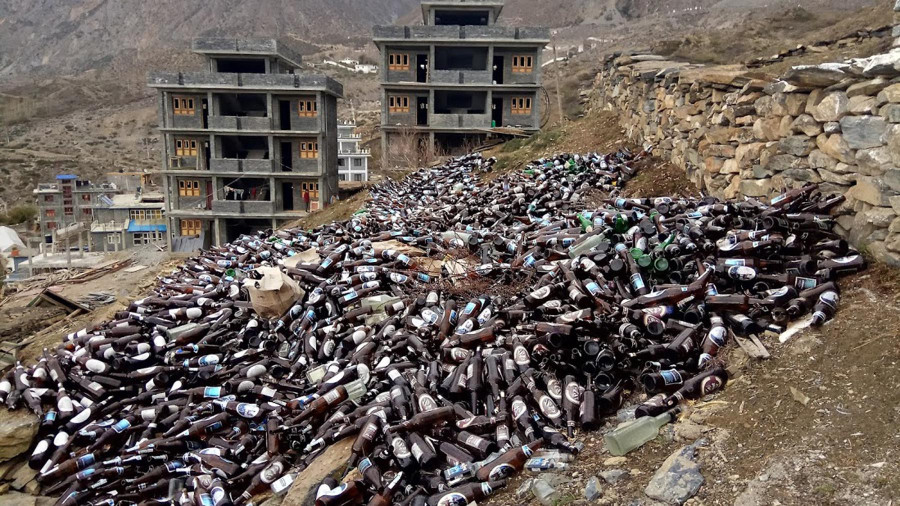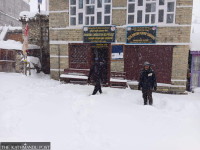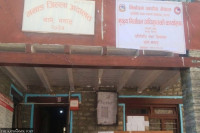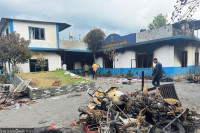Gandaki Province
Muktinath is littered with mounds of garbage
With the growing number of tourists and a shortage of garbage bins, rubbish can be seen scattered along the temple area, roadsides and in the bazaar area.
Ghanshyam Khadka
The Ranipauwa area, adjacent to the premises of Muktinath temple, a famous religious site for both Hindus and Buddhists, in Bahragaunmuktichhetra Rural Municipality, Mustang, has slowly started to not look like a place of pilgrimage. The area is littered with mounds of garbage, glass and plastic bottles.
The temple, which lies at an altitude of 3,710 metres from the sea level, is heavily polluted. The area sees a heavy footfall of both domestic and international tourists, but it does not have a proper waste management system, which has led to the pollution.
“There are no disposal bins even in the temple area. The bazaar area is littered with waste materials,” said Preeti Karki, a domestic tourist who was in Muktinath recently. “The area was filthy.” The Muktinath area produces around one quintal of garbage on a weekly basis, according to Bahragaunmuktichhetra Rural Municipality.
Seven months ago, the local unit had collected eight tractors of garbage, including plastic and glass bottles from Ranipauwa and Jharkot areas, and dumped it onto an open field. Since then, locals as well as visitors have taken to haphazard disposing of waste, say locals themselves.
A motorable road to Muktinath was constructed only six years ago. This connectivity ensured easy access to the area for outsiders and made life easier for the locals. But what this also brought to this previously untouched area was buses full of tourists—and a lot of garbage.
Surat KC, a local of Beni, said the parking area used by public vehicles is gradually turning into a dumping site. “The vehicles bring visitors which is good for the area, but at the local level there were no preparations to host the overwhelming number of visitors. Hotels and grocery stores started operations overnight to accommodate the number of tourists but not much thought was given to the potential waste generation and ways to dispose of it,” said KC. This highlights the local unit’s incompetence in planning and managing the area, says KC.
Due to a shortage of garbage bins, refuse remains can be seen scattered along the temple area, roadsides and in the bazaar area. But the local unit is yet to introduce proper waste management techniques for waste disposal.
Phenchok Chhekten Gurung, chairman of Bahragaunmuktichhetra Rural Municipality, however, said that his office has launched several campaigns to keep the temple area clean. “The number of tourists has increased too, which is good for the local economy, but we did not foresee the environmental pollution heavy footfall would cause,” said Gurung, adding that his office has allocated the necessary budget for waste disposal in the current fiscal year.
The garbage in the area comes in its crudest forms—plastic bottles, discarded plastic packets of noodles, cooking oil, biscuits, among others. According to Gurung, his office is looking at ways to control this pollution. “We plan to sell the plastic waste to scrap dealers in Beni, Myagdi,” he said.
However, locals believe that more stern action is the need of the hour to control the level of pollution in the area from escalating further. “The local unit should impose a fine to those who dispose waste out in the open,” said Ram Gurung, a local hotel entrepreneur in Lomanthang, Upper Mustang.
“Plastic waste is starting to threaten the fragile ecosystem of this region. The local unit should put a complete ban on the use of plastic materials and should encourage the locals and tourists to use biodegradable materials instead of polythene bags,” added Gurung.




 14.24°C Kathmandu
14.24°C Kathmandu.jpg)











